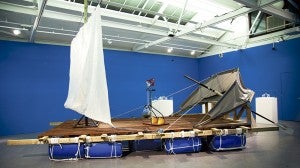Chuckatuck native receives prestigious sustainability award
Published 9:12 pm Monday, September 19, 2016

- Yussef Agbo-Ola, a Chuckatuck native, received the prestigious Flow Associates Sustainability Award for his graduate coursework at Wimbledon College of Art at the University of the Arts London. (Submitted Photo)
A Chuckatuck native received a prestigious award for combining art and sustainability earlier this summer.
Yussef Agbo-Ola, 26, a recent graduate of the Wimbledon College of Art at the University of the Arts London, was awarded this year’s Flow Associates Sustainability Prize for his graduate coursework and projects.
“As we saw from the phenomenal attention he drew at the UAL Summer Shows, Yussef is certainly a rising star,” said Dr. Edwina Fitzpatrick, a course leader in the Wimbledon College of Art.
Flow Global, an organization dedicated to teaching international communities about culture change, awarded Agbo-Ola.
“For this particular prize, I asked people who applied to describe how their work engaged with ideas about how people and planet can thrive, and it was a real struggle to choose from the 12 people who did apply,” stated Bridget McKenzie of Flow Global in an excerpt from the Wimbledon College of Art blog. “But in the end we chose Yussef Agbo-Ola.”
For one of his projects, Agbo-Ola helped co-build an eco-friendly raft. The project was selected as part of an exhibition celebrating COP21, an annual international climate conference, according to a university press release.
“I was very, very excited and grateful for the opportunity and to be a voice for the community,” Agbo-Ola said.
The raft, about seven to eight feet in length, was designed to be functional after a severe natural disaster. The raft features, composed primarily of recyclable materials, include two sails, a long paddle and a unique breathing device in the center of the raft.
“Some think that art is just a painting,” Agbo-Ola said.
The purpose of the device was to extract oxygen from algae to facilitate breathing. The contraption would prove useful in a post-apocalyptic setting where oxygen may be scarce, Agbo-Ola said.
He said projects like the raft help show society “how biology works with our systems.” As a result, “our consciousness of them will be heightened,” he said.
“Even if it isn’t a functioning object, it builds interest and conversation,” he said.
Agbo-Ola has always had a fascination for art and the sciences since his youth. Growing up in rural Chuckatuck, he was forced to tap into his creative side.
“I used my dreams and imagination for my creativity,” he said.
In addition, as he matured, he traveled to various countries and captured his experiences. Earlier this summer, he published a photo book, “artist + anthropologist = nigeria, vol. 1,” from his time in Nigeria.
As a student, his artwork was showcased at the Virginia Fine Arts Museum in Richmond and he was heralded for “materializing his perception of the divine into intricate visual narratives,” read an excerpt from culture blog, “Another Africa.”
In fact, Agbo-Ola said encouragement from VMFA representatives was the main reason he decided to attend the University of the Arts London for graduate school.
Agbo-Ola relished his time at the university and highlighted some key cultural differences along the way.
As an undergraduate student at Virginia Commonwealth University and later Virginia State University, he felt he was able to improve his skill set but he noted the courses were more “technical and traditional.” But his coursework in London was more hands-on and “very experimental,” he said.
Over the next year, Agbo-Ola plans to engage in various sustainability projects in Europe, Africa and Asia. He also co-founded an initiative with his brothers called “wi-have,” which seeks to use eco-friendly means for international community development, particularly in impoverished areas.
Since its inception, the collective has rallied people from all corners of the world, according to Agbo-Ola.
He hopes to impact his international community with his collective by utilizing science and sustainability.
“We want to allow our projects and creativity to come from different cultural perspectives,” he said. “We want to use the DNA of a place to build labs and schools. We want to learn from the community and empower the community.”







